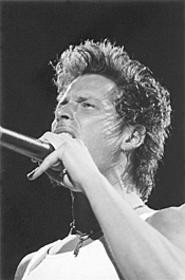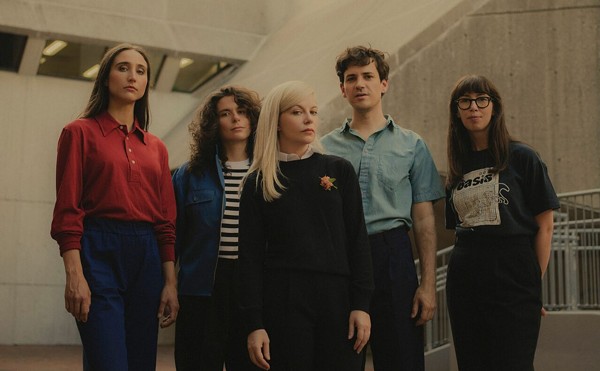Audioslave has prompted a torrent of ink during its brief lifespan. This is understandable, given the severe shortage of intriguing, built-to-last rock stars on the current scene, and the fact this band's got pedigree to spare: Guitarist Tom Morello, bassist Tim Commerford, and drummer Brad Wilk hail from Rage Against the Machine, and vocalist Chris Cornell is late of Soundgarden. Too bad much of what's been written and reported about the combo has been rife with laziness and preconceptions. In short, most of those who've attempted to tell this tale have taken their cue from pop-songwriting hacks and relied solely on the most obvious hooks.
Here's one theory that may account for the coverage. Audioslave is a supergroup, and because supergroups usually suck (Blind Faith, anyone?), scribes were sharpening their scimitars even before the act's self-titled debut appeared in November 2002. But when Audioslave turned out to be a solid piece of work, the journo-pack shifted its approach, predicting that, since most supergroups are short-lived (Blind Faith, anyone?), Audioslave would combust in short order. A self-fulfilling element was added to this prophecy by stories that cast doubt upon the closeness of the bandmates -- not to mention narratives that implicitly accused Cornell of trying to take over the quartet. After all, correspondents hinted, even the most rudimentary mathematician could figure out that Audioslave's music should be three-quarters Rage to one-quarter Soundgarden, and when things didn't turn out that way, it meant that the sort of political infighting known for ripping supergroups apart (Blind Faith, anyone?) was obviously a factor already.
Such speculation seems a bit loopy, but it rings true for Morello. "That basically covers my last six months of doing press," he says with a chuckle. "Audioslave is a brand-new band. It's not an amalgamation of previous bands. You could call us the first supergroup garage band, in that Audioslave was formed just like any other band that practices in a high school basement is formed -- by friends making music together. So, while all of us had been in previous bands, we were really starting from day one, year zero, in putting this thing together. And yet, when the record was coming out, we discovered that a pall was cast by the history."
In addition, past achievements also caused expectations for Audioslave to climb to skyscraper heights. Morello calls Rage and Soundgarden "genre-defining bands," and that's hardly hyperbole; the former was arguably the first outfit to incorporate hip-hop into metal without alienating riff lovers, and the latter laid the groundwork for the Seattle grunge movement that ultimately unleashed Nirvana, Pearl Jam, and more. Asking Audioslave to accomplish similar feats straight out of the gate in order to be viewed as a success is unrealistic in the extreme, especially considering the amount of time it took for Rage and Soundgarden to receive their due.
"That's the hilarious part," Morello says. "Because I remember the press's reaction when Rage Against the Machine and Soundgarden were first formed." He effects a comically whiny critic's voice: "'Rock and rap together? Are you cra-a-a-zy? They'll never play that on the ra-di-oooooo.' And with Soundgarden, they would go" -- that voice again -- "'It's like Led Zeppelin, but they're out of tune. They seem so un-hap-py, and they're not wearing sequined robes.'" He cackles before noting, "That's the way it was, which is why it's so funny, 10 years down the road, to have those bands be seen in this kind of iconic way."
Morello's wry sense of the absurd may come as a shock to anyone familiar with Rage, a notoriously somber four-piece. Then again, he was the instrumental backbone of the band, not its mouthpiece. The nephew of Jomo Kenyatta, onetime president of Kenya, Morello came of musical age in Los Angeles, developing a startlingly distinctive guitar style that mated meaty power chords, a funky sense of time, and the ability to make noises using six strings and an amplifier that most of his so-called peers couldn't approximate without a synthesizer.
In the early '90s, Morello joined forces with fiery frontman Zack de la Rocha to form Rage. The band's first album, 1992's Rage Against the Machine, was as incendiary as its cover image, a photo of a man on fire. Politically informed music wasn't in vogue at the time, so de la Rocha's blistering left-wing commentaries on cuts such as "Bombtrack," "Killing in the Name," and "Bullet in the Head" came across as fresh and relevant. These screeds were often one-dimensional as well, but the vital playing of Commerford, Wilk, and -- most of all -- Morello more than compensated for this drawback on disc and onstage.
Unfortunately, the raw talent with which Rage overflowed never truly translated into the sort of artistic growth of which it seemed capable. The players issued only two other collections of original material -- 1996's Evil Empire and 1999's The Battle of Los Angeles -- and even though both sport some astonishing offerings, they largely stick with the formula established on their first platter, rather than building upon it. In late 2000, de la Rocha departed for a solo career that's apparently still in a conceptual phase. But Morello, Commerford, and Wilk felt no need to split, and they began trolling for a new comrade. After an initial dalliance with B-Real of Cypress Hill, they contacted Cornell, who had been on his own since April 1997, when the members of Soundgarden officially dissolved their partnership in favor of individual projects.
According to everyone concerned, the chemistry between Cornell and the Rage refugees was bubbly from the beginning. But when arguments over profit potential erupted among assorted managers, Cornell backed out -- a key bit of evidence seized upon by journalists interested in characterizing Audioslave as more of a business merger than a band.
Somehow, the subsequent decision by all parties to sack their representatives and sign jointly with a single firm is seldom taken into consideration. Neither is the quality of the disc the musicians made, which has a more sophisticated flow than anything Rage ever managed, taking listeners through myriad emotions instead of only a handful.
"We wanted to make the kind of record that was a listening experience from beginning to end," Morello acknowledges. "We weren't trying to pad out a few singles with some filler. We wanted it to be like some of our favorite records -- Led Zeppelin IV, the Clash's London Calling -- where you can drop the needle on the first song and go on a journey with the band."
Some stops on this trip are more rewarding than others; the album has some slack moments. But almost every cut, from such beefy workouts as "Set It Off" and "Exploder" to more contemplative numbers, such as "I Am the Highway" and "The Last Remaining Light," gives off a steady glow of intelligence and earnestness. This bodes well for the band's future, which doesn't foretell a swift breakup, despite persistent predictions to the contrary.
"I think that will slowly be put to rest. To me, it's very clear that Audioslave is a band that's here to stay, that we've made a fine rock record, and that we're coming to your town soon. And when you see the band play, all doubts will be dispelled."













